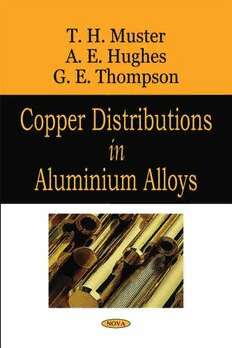
Copper Distributions in Aluminium Alloys PDF
116 Pages·2009·3.429 MB·English
Most books are stored in the elastic cloud where traffic is expensive. For this reason, we have a limit on daily download.
Preview Copper Distributions in Aluminium Alloys
Description:
Aluminium alloys are used extensively throughout the world, in items such as decorative architectural applications through fasteners to high strength structural applications. Such a diverse range of application areas has a similarly diverse range of requirements for materials properties and performance. The mechanical properties are achieved through alloying aluminium with a wide range of elements. Copper, which is one of the major alloying additions, is added in varying amounts to many of the different aluminium alloy series, with the lowest levels in the purest wrought aluminium alloys (AA1xxx series) and the highest levels in the high strength AA2xxx series.The distribution of copper in aluminium alloys varies from copper atoms dispersed in solid solution through the formation of clusters of copper atoms and then onto to a range of intermetallic compositions and particle sizes. The presence of copper in all these forms, particularly in the AA2xxx series, has a significant impact on the chemistry and electrochemistry of the surface of the alloy and, hence, on the susceptibility to corrosion and approaches to metal finishing. This book examines how the copper distributions change, as a result of corrosion reactions, and explores the influence of these changes on continued corrosion. The influence of the distribution of copper in aluminium alloys on metal finishing processes and the redistribution of copper as a result of metal finishing are also examined.
See more
The list of books you might like
Most books are stored in the elastic cloud where traffic is expensive. For this reason, we have a limit on daily download.
